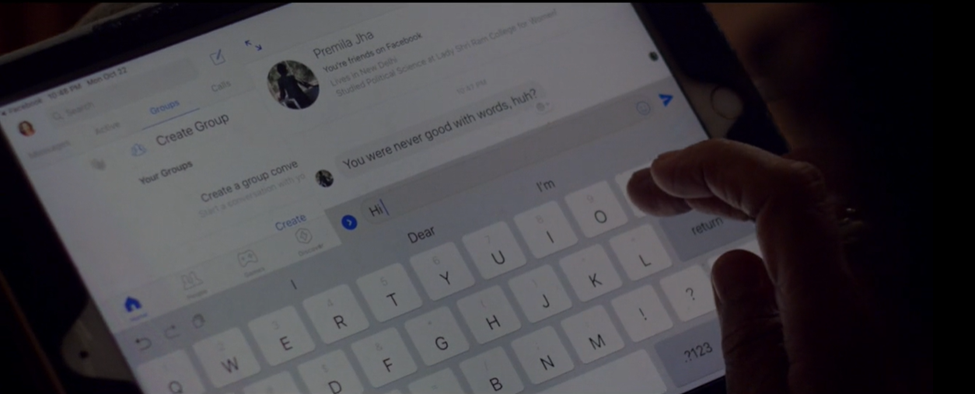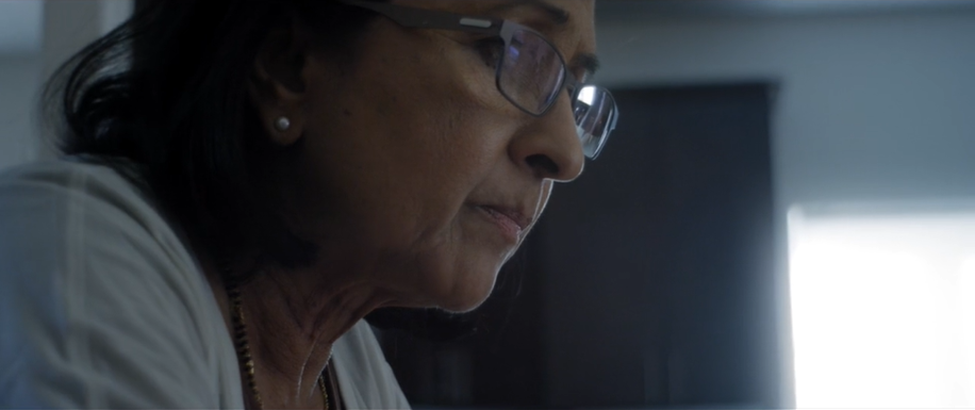
Halwa (Bhakta, Bajpai, 2018) is the story of Sujata (played by Vee Kumari) as she reaches out to an old friend over social media following the death of her friend’s spouse. I had the chance to interview the co-directors, -editors, and -writers of the film: Nirav Bhakta and Gayatri Bajpai.
Miranda Sprouse: Tell us about your short film, Halwa.
Nirav Bhakta and Gayatri Bajpai: Halwa is the story of an older Indian immigrant woman re-discovering love and her sense of self. On the eve of her wedding anniversary, empty-nester Sujata Chopra attempts to find some joy in her broken marriage, until she learns about the passing of her childhood companion’s spouse over Facebook. Having been disconnected from this woman for over thirty years over a misunderstanding, Sujata finds the courage to reach out to send her condolences. They reconnect, sparking friction when Sujata’s controlling husband, Dr. Chopra, finds out.
MS: Where did the story idea originate?
NB/GB: It began with a conversation we had with Vijaya Kumari, our lead and executive producer, about the lack of substantial roles for South Asian women in the industry. Constantly on offer are roles for Indian mothers nagging their children or arranging marriages.
As we talked to Vijaya about creating a character who would mean something more to her, she opened up about a brief past relationship that was quite oppressive. We anchored the story in this experience.
The angle of social media connecting Sujata to a past flame grew from stories we’d heard within our own communities. There are tales of couples who have gotten arranged marriages and raised families, only to later find their high school sweethearts online and leave their marriages for one another.
There was also this idea of exploring Indian female intimacy. It came from the intense physical and emotional closeness girls have always been free to have in the past through friendship in India—but not often as lovers.
An image grew from there: a lonely woman confined to domesticity and an unhappy marriage who finds the courage to message her girlhood love.
MS: What about Sujata’s character made you want to bring her to life onscreen?
NB/GB: There was something quiet and gentle about her at first. She is the type of woman who has kept her head down to make a good life as an immigrant in America. She’s lived an entire life of sacrifice with her family relying on her to run a household.
Now she’s an empty-nester, so what is that life like if not devoted to family? Sujata has buried parts of herself in the past, but they’re not gone.
We wanted the audience to feel that while all seems well on the surface at first, this marriage carries a secret, and Sujata carries a bigger one of her own. The first-gen immigrant parents and grandparents that we often see as one-dimensional have lived whole lives we didn’t witness. Some of them have inhibited desires that run deep.
MS: How did Sujata’s story progress throughout production?
NB/GB: We started with a minimalistic outline and then went through multiple drafts of the script, in which we incorporated lighter moments into the conversations Sujata has over the phone.
Initially, we had a lot more dialogue on paper. But when we talked about the loneliness of Sujata’s daily life to our cinematographer, David Kirkeby, he referred us to a filmmaking technique used by Andrea Arnold where she always grabs a silent take of every shot. We tried it. It forced us to focus all the more on her isolation and the subtext in her actions.
Initially, we also had only voiceover from her flashbacks, but on set we chose to shoot one visual memory of the two younger versions of Sujata and her former lover making Halwa together. We intercut this with the present-day Sujata cooking in a pivotal scene near the end. We felt that her mental state by this time warranted the tangible presence of her memories.
MS: You have said that you wanted to break the stereotype of the “Indian mother who always ends up arranging someone’s marriage.” How do you feel Halwa accomplishes this?
NB/GB: The desires of an older women—much less an immigrant of color—are not of interest to most filmmakers. Such a character often exists to serve the storylines of younger characters who are more traditional “leads.” Sujata is still an Indian mother, but we wanted to get beyond her making rotis.
Immigrants are often portrayed onscreen as people who keep their heads down and make sacrifices. This is beautiful but only part of the picture. A fellow HBO Visionaries filmmaker, Julie Zhan, said of her film Zoetic [2019]—about her Chinese immigrant mother dating while older—that it is a coming-of-age story. In Halwa, too, Sujata comes of age as an older LGBTQ Indian woman reaching out to her soulmate.
MS: We live in a time where social media is typical in our everyday routine. Sujata relies on Facebook to reconnect with her old friend, Premila. Do you believe that social media gave her the confidence to reach out? Would she have found another way if social media wasn’t readily available?
NB/GB: Talk of social media usually summons images of millennials taking selfies, but our parents and their parents are also living in the digital age. It’s reconnected them with friends they haven’t seen in decades, who live half a world away. Our relatives in other countries are more aware of our lives than they were ten years ago. That got us thinking about how, while social media often gets a bad rap, it can also lead to something beautiful, especially for migrants.
In Halwa, a Facebook account opens up our character’s world. The image of her long-lost soulmate, Premila, changes everything for Sujata. Seeing the photo is a visceral experience for her. Social media becomes a backchannel for some frowned-upon connections and emotions she’s buried deep.
Maybe she would have picked up a pen or the phone without seeing Premila, but we can’t say when.
MS: Halwa recently won the top prize in HBO’s Asian Pacific American Visionaries program in 2019. As a filmmaker, what does this mean to you?
NB/GB: It means visibility and getting heard. The film streaming on HBO means we get to share an authentic Indian immigrant story on a platform with incredible reach. That affirms that our experiences can resonate with a larger audience. We loved being a part of the APA Visionaries experience, and joining this brilliant, supportive community of Asian American creators.
MS: You said that the desires of older immigrant women do not interest most filmmakers. Why do you feel that there should be more focus placed on these women? Why should filmmakers make a story about them?
NB/GB: Why shouldn’t we tell stories about them? As filmmakers we look for narratives that fascinate us, and our communities are teeming with them. It’s 2019. We need to do our research and have a little imagination.
Onscreen, Asian American parental figures used to keep their heads down and get it done. There’s some truth to that immigrant stoicism. But there’s much more to talk about, and filmmakers are embracing this. When we talked to our lead Vee Kumari about her experiences and did our research, we became engrossed in Sujata’s character.
MS: What do you hope that viewers who watch Halwa take away from it? What message do you hope that they remember?
NB/GB: We hope they will have felt something during Sujata’s story and rooted for her.
MS: What’s next for you?
NB/GB: Both as a team and individuals we have several longer form projects in the pipeline. The goal is to go into our writers’ hole and finish these scripts ASAP. But immediately next is a documentary short we both co-directed prior to Halwa. Shot as a portrait documentary, it follows a Mexican immigrant and trans sex worker who opens up about being trafficked by a drug cartel.
Halwa is available for streaming on HBO.
Author Biography
Miranda Sprouse is an undergraduate student at the University of North Carolina Wilmington. She is majoring in film studies and earning a certificate in professional writing. Miranda enjoys watching movies, screenwriting, and film analysis. She hopes to have a future career that combines her passions for writing and film.








































